广东省深圳市文汇中学九年级英语上册Unit1 Wise men in history Grammar课件 (新版)牛津深圳版
文档属性
| 名称 | 广东省深圳市文汇中学九年级英语上册Unit1 Wise men in history Grammar课件 (新版)牛津深圳版 | 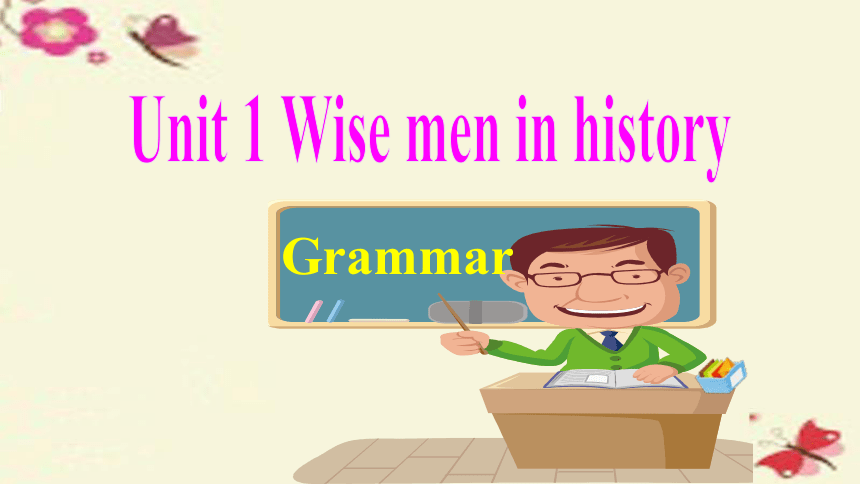 | |
| 格式 | zip | ||
| 文件大小 | 1.2MB | ||
| 资源类型 | 教案 | ||
| 版本资源 | 北师大版 | ||
| 科目 | 英语 | ||
| 更新时间 | 2017-07-22 00:00:00 | ||
图片预览

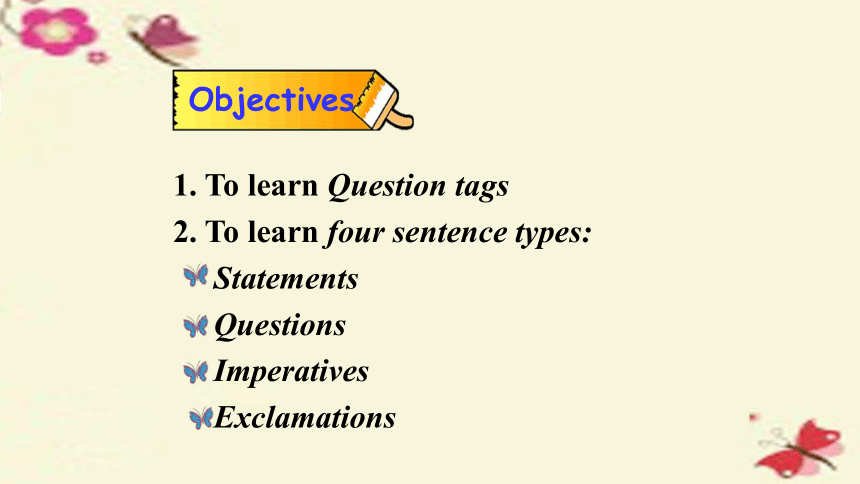
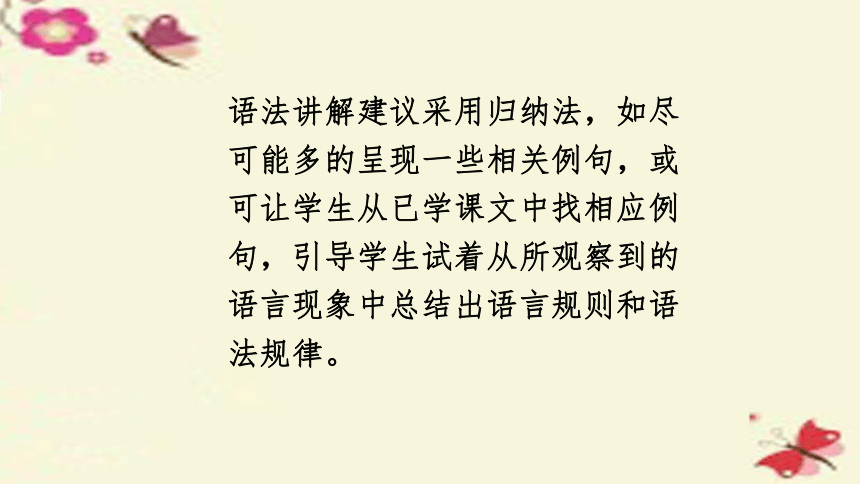


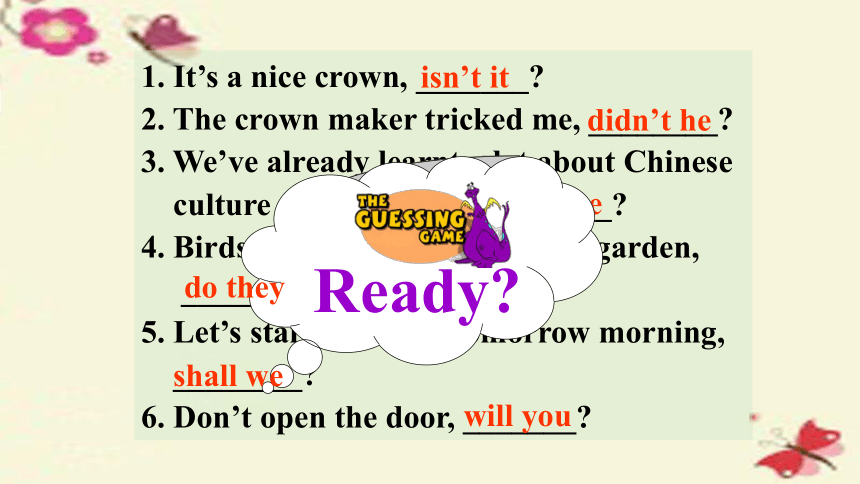
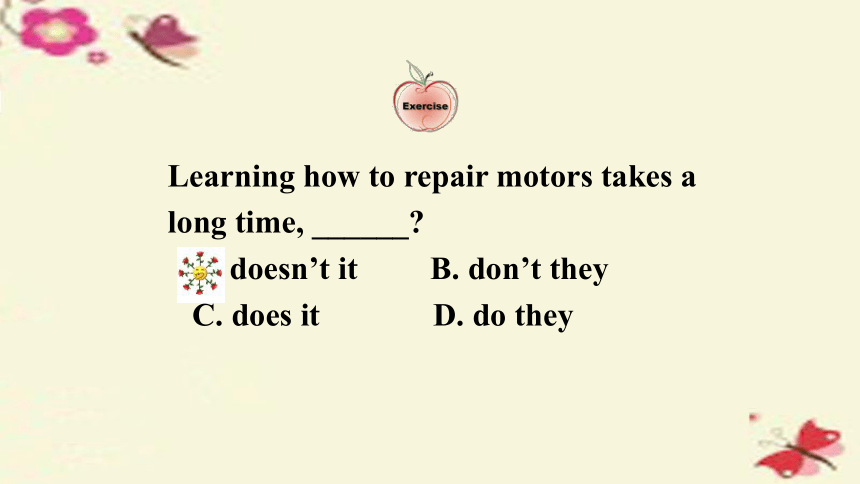
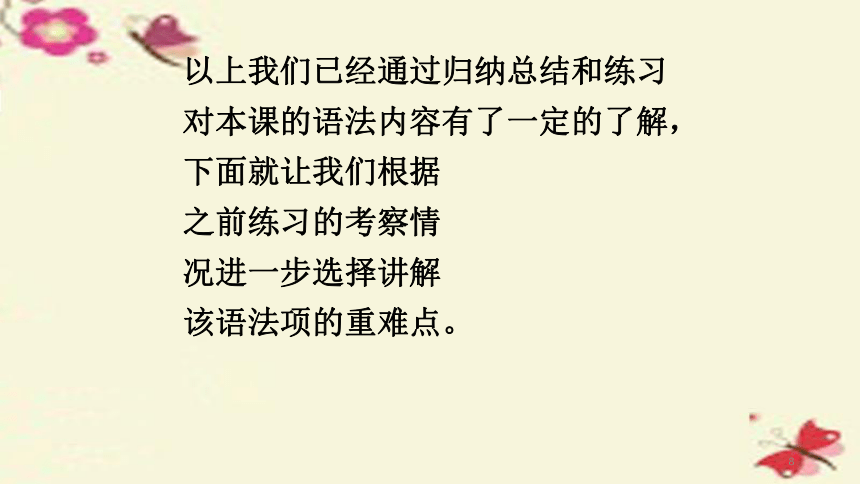
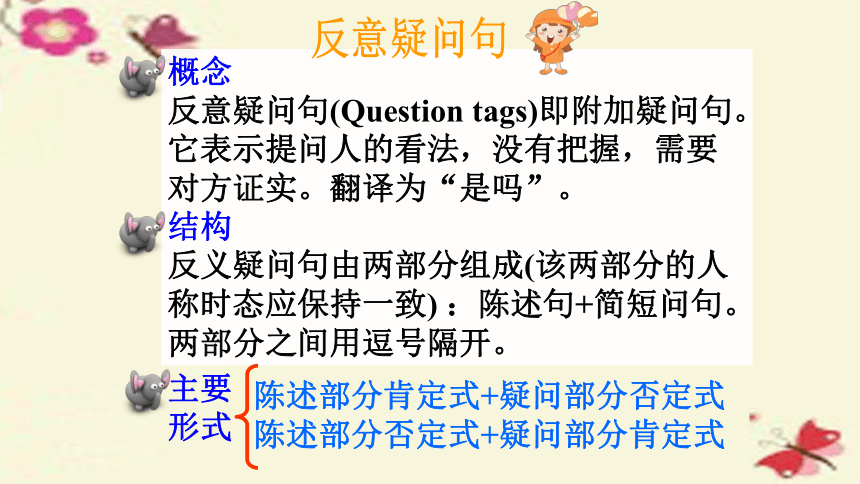

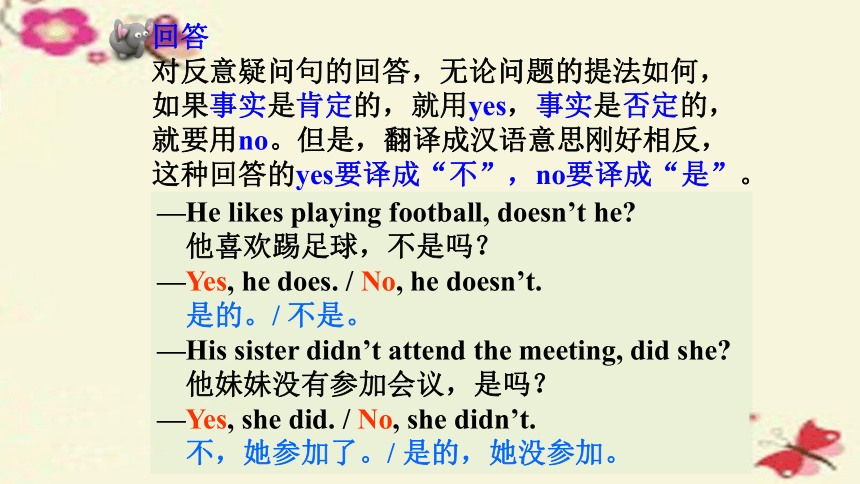
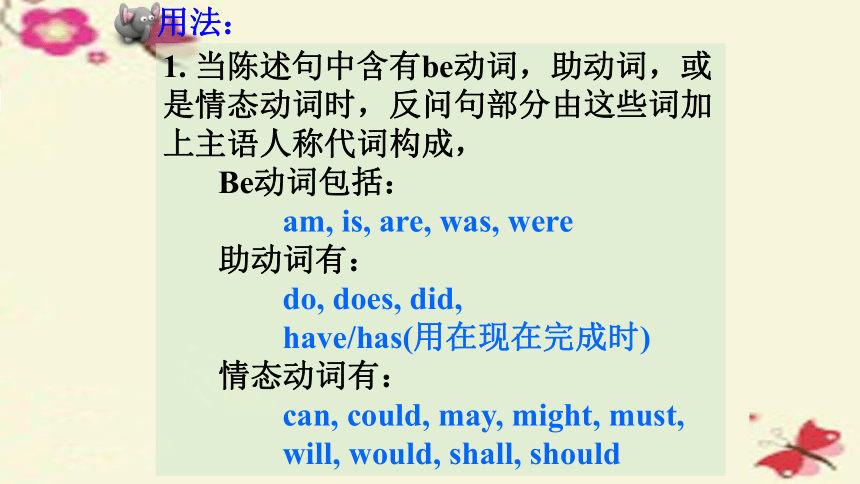
文档简介
课件54张PPT。GrammarUnit 1 Wise men in history To learn Question tags
2. To learn four sentence types:
Statements
Questions
Imperatives
Exclamations语法讲解建议采用归纳法,如尽可能多的呈现一些相关例句,或可让学生从已学课文中找相应例句,引导学生试着从所观察到的语言现象中总结出语言规则和语法规律。Question tags It’s a nice crown, isn’t it?
2. The crown maker tricked me, didn’t he?
3. We’ve already learnt a lot about Chinese culture and history, haven’t we?
4. Birds rarely build nests in our garden, do they?
5. Let’s?start?out?early?tomorrow?morning, shall we??
6. Don’t?open?the?door,?will you?1. It’s a nice crown, _______?
2. The crown maker tricked me, ________?
3. We’ve already learnt a lot about Chinese
culture and history, __________?
4. Birds rarely build nests in our garden,
_______?
5. Let’s?start?out?early?tomorrow?morning,
________??
6. Don’t?open?the?door,?_______?gohaven’t weisn’t itdidn’t hedo theyshall wewill youLearning how to repair motors takes a long time, ______?
A. doesn’t it B. don’t they
C. does it D. do they 以上我们已经通过归纳总结和练习对本课的语法内容有了一定的了解,下面就让我们根据
之前练习的考察情
况进一步选择讲解
该语法项的重难点。1概念
反意疑问句(Question tags)即附加疑问句。它表示提问人的看法,没有把握,需要对方证实。翻译为“是吗”。
结构
反义疑问句由两部分组成(该两部分的人称时态应保持一致) :陈述句+简短问句。两部分之间用逗号隔开。反意疑问句陈述部分肯定式+疑问部分否定式
陈述部分否定式+疑问部分肯定式主要形式读法规则
反义疑问句陈述部分用降调,问句部分可升可降。提问者对陈述部分把握较大时,问句部分用降调;反之用升调。
速记方法
前肯后否,前否后肯,前be后be,前情态后情态,前无be或情态后加助,并改为否定,时态一致。回答
对反意疑问句的回答,无论问题的提法如何,如果事实是肯定的,就用yes,事实是否定的,就要用no。但是,翻译成汉语意思刚好相反,这种回答的yes要译成“不”,no要译成“是”。—He likes playing football, doesn’t he?
他喜欢踢足球,不是吗?
—Yes, he does. / No, he doesn’t.
是的。/ 不是。
—His sister didn’t attend the meeting, did she?
他妹妹没有参加会议,是吗?
—Yes, she did. / No, she didn’t.
不,她参加了。/ 是的,她没参加。用法: 当陈述句中含有be动词,助动词,或是情态动词时,反问句部分由这些词加上主语人称代词构成,
Be动词包括:
am, is, are, was, were
助动词有:
do, does, did,
have/has(用在现在完成时)
情态动词有:
can, could, may, might, must,
will, would, shall, shouldEg:
The?Green?weren't?at?home?last?night,?
were?they???
You often watch TV in the evening,
don't you?
The?boys?will?play?games,?won't?they??
You?have?been?skating?for?five?hours,?
haven't?you?2. 反意疑问句的陈述部分带有little, few, never, hardly, seldom, nobody, nothing等否定意义的词时,问句部分用肯定式。如:
①She never tells a lie, does she?
(不用doesn’t she?)
②He was seldom late, was he?
(不用wasn’t he?)3. 祈使句用于反意疑问句中
a. 肯定的祈使句, 用will you(表示请求) /
won’t you(表示提醒)。
Listen to me, will you (won’t you)?
b. 否定的祈使句, 用will you。
Don’t play with fire, will you?
c. Let’s 和 Let us的祈使句:Let’s go to school, shall we?
Let us help you, will you?Let’s …, shall we?
Let us …, will you? Queen: You aren’t happy, _______?
What happened?
King: It’s my new crown. Take a look at it,
________?
Queen: It looks beautiful, _________?
What’s wrong with it?
King: It isn’t made completely of gold.
That’s why I’m angry.
Queen: The crown maker tricked you,
_________? How did you find out?
King: Archimedes told me. Let’s have dinner
with him tonight, ________?
Queen: OK.are youwill youdoesn’t itdidn’t heshall we King Hiero showed the crown to the queen later. Complete their conversation with question tags. (P 8) A Sentence types1. King Hiero asked a crown maker to
make him a golden crown.
2. It’s a nice crown, isn’t it?
3. Is it made completely of gold?
4. This problem seems difficult to solve.
What should I do?
5. Send him to prison!
6. Will you stay home or go sightseeing
on National Day?
7. What a bad man he is!Look and try to tell the sentence types.Wh-question Tag questionPositive statement Imperatives Yes/No question Alternative questionExclamations 1. King Hiero _____ a crown maker
_______ him a golden crown.
2. It’s a nice crown, _______?
3. ___ ___ _____ completely of gold?
4. This problem seem difficult to solve.
______ should I do?
5. _____ him to prison!
6. ____ you ____ home ___ go sightseeing
on National Day?
7. ______ a bad man _____!goaskedto makeisn’t itIs it madeWhatSendWill stay orWhathe is1. _____ good advice you have given to me! I’ll take it. (填空)
2. _____ wide the streets are! (用合适的词语填空)
3. You should not touch the exhibits.
(改为否定祈使句)
______ touch the exhibits.
4. Mr. Hu taught her maths last year.
(改为一般疑问句)
What How Don’t 按要求填空。Did Mr. Hu teach her maths last year?5. Did you do your homework at school yesterday?(改为陈述句)
6. Kate’s bike was stolen last week.
(对划线部分提问)
7.The foreign visitor comes from Russia.
(用Australia完成选择疑问句)
??
8. You’re?in?Grade?two?now,?_________?
(完成反意疑问句)I did my homework at school yesterday.Whose bike was stolen last week?Dose the foreign visitor come from Russia or Australia?aren’t you1以上我们已经通过归纳总结和练习对本课的语法内容有了一定的了解,下面就让我们根据
之前练习的考察情
况进一步选择讲解
该语法项的重难点。1陈述句是陈述一个事实或者说话人的看法的,陈述句分为肯定句和否定句。
陈述句句末用句号(。),朗读时用降调。定义:结构:陈述句的肯定式
1.主语+系动词+表语
Tina is my friend.
2. 主语+不及物动词
The river is flooded.
3.主语+及物动词+宾语
He bought an umbrella.
4.主语+及物动词+间接宾语+直接宾语
He passed me a cup of tea.
5.主语+及物动词+宾语+宾语补足语
She told me to buy a ticket.II. 陈述句的否定式
主语+be+not+表语
He is not a teacher.
主语+助动词/情态动词+not+谓语动词
+其他
I don't think you are right.
He hasn't yet paid the money.
他尚未付钱。使用“not”以外的否定词:
副词:never, seldom, hardly, little,
neither等。
She seldom comes to see me.
她不常来看我。
b. 形容词:no, few, little等。
He has few friends in Hong Kong.
他在香港几乎没有朋友。
c. 代词:nothing, nobody, none等。
I found nobody in that house.
在那栋房子里我没看到任何人。疑问句的主要交际功能是提出问题,询问情况。分为一般疑问句、特殊疑问句、选择疑问句和反意疑问句。
疑问句句末用问号(?)。定义: 一般疑问句通常用来询问一件事情是否属实。答句通常是"yes或no"。
句型一:Be +主语+ …?
Are these books on the desk?
这些书在桌子上吗?
句型二:Do/Does/Did+主语+谓语+…?
Do you like English?
你喜欢英语吗?
句型三:情态动词+主语+谓语+…?
Must I finish my homework now?
我必须现在完成我的家庭作业吗?一般疑问句句型四:Have/Has+主语+过去分词+…?
Have you heard from him?
你收到他的来信吗?
另外,还有以be动词、助动词或情态动词的否定缩写形式开头的一般疑问句,这种句子一般表示请求、惊讶和对事物的看法等,回答时所用的yes和no表达的意思和汉语的习惯不同。例如:
-- Isn't he tall?
难道他不高吗?
-- Yes, he is.
不,他很高。 对句中某一成分提问的句子叫特殊疑问句。特殊疑问句以疑问词开头。
常用的疑问词有:what、who、whose、which、when、where、how、why等。不能用yes或no回答。朗读时用降调。
例如:
Who is singing in the room?
What class are you in?特殊疑问句句式: 特殊疑问词 + 一般疑问句
疑问词分为三类
疑问代词: what, who, which, whose, who
疑问词组: what(which, whose)+名词
疑问副词: when, where, why, how We use ‘Wh-’ questions to ask for information about someone or something.Ⅰ. what
问姓名;
问物品;
问职业;
what about 用来征求意见或询问消息,相当于how about
what colour 问颜色;
what class 问哪个班级;
what size 问尺寸 Ⅱ. who---Person (对人提问)
-- Who will visit you tomorrow?
-- My father.Ⅲ. when---Time (对时间提问)
-- When will you finish your homework?
-- Tomorrow.Ⅴ. why---Reason (对原因提问)
-- Why are you late?
-- Because I missed the bus.Ⅳ. where---Place (询问地点、场所)
Where do you live?
Where are you going? - How do you go to school?(问方式) - I go to school by bus.
- How are you?(问健康) -I’m fine. Thank you!
How is the weather today?(问天气)
(2) How+形容词(副词)~? 询问年龄、身高、数量、次数、距离……
How much are they? (问价格) Ⅵ. how
(1) How…? 询问做某事的方法、手段及健康、天气…… Millie: What a nice cake! ______ birthday is it
today?
Amy: It’s my birthday, Millie.
Millie: Happy birthday, Amy! _____ do you
usually celebrate your birthday?
Amy: We go out for a birthday dinner.
Millie: _____ goes to your birthday dinner?
Amy: My grandparents, aunts, uncles and
cousins.
Millie: I see. ______ do you have the dinner?
Amy: At a restaurant near my home.
Millie: ______ do you get for your birthday?
Amy: Books, clothes, shoes, toys and some other
nice things.WhoseHowWhoWhereWhatMillie is asking Amy about her birthday. Complete their conversation with the correct question words. 选择疑问句定义:
提出两种或两种以上的情况,要求对方选择一种情况回答的问句。两种情况之间用or连接。
回答:
回答不用yes/no,用一个完整的句子或其省略形式。语调前升后降。分类:
一般选择疑问句和特殊选择疑问句
一般选择疑问句:
一般疑问句+or+被选择部分?
-- Do you like apples or pears?
-- I like pears.
2. 特殊选择疑问句:特殊疑问句, +A or B?
-- Which would you like better, tea or
coffee?
-- I like coffee.祈使句的结构及用法
祈使句表示命令、请求、建议、或劝告等等。主语通常被省略,谓语动词用原形,句末用感叹号或句号,读降调。1.肯定的祈使句
1) 句型:以动词原形开头(省略主语)
Come in!
2) 动词前加do, 加强语气。表“务必,一定”
Do come on time! 一定要准时来!
Do look out! 一定要小心!
2. 否定祈使句
1) Don't +动词原形
Don't be late!
2) Let's + not + 动词原形
Let's not speak loudly! 1.由what引导的感叹句
What + a/an +形容词 + 可数名词的单数
+ 主语 + 谓语!
What a beautiful girl she is!
2) What + 形容词 + 可数名词复数 + 主语
+谓语!
What important jobs they have done!
3) What+形容词+不可数名词+主语+谓语!
What sweet water it is! 2.由how引导的感叹词
1) How+形容词或副词+主语+谓语!
How interesting the dog is!
2) How+形容词+a/an+可数名词的单数形式
+主语+谓语!
How useful a subject it is!
3) How+主语+谓语!
How time flies!3.一些特殊形式
陈述句、疑问句或祈使句+感叹号,
表示某种强烈的感情
He runs so fast!
2) 一个词或词组
Wonderful! Look out! Great!
3) 以there here 等副词开头
There she is!
There goes the bell!4. 如何判断用what还是用how来引导感叹句
方法一:凡是用aan开头的,多用what
方法二:凡是形容词+名词,多用what
方法三:其他一般用how How can I find out___
The crown is nice___
How wonderful___
The king was not happy___
Please close the window___
What a nice crown___
This is difficult, isn’t it___
Leave me alone___ Add a full stop (.), a question mark (?) or an exclamation mark (!) to the end of the following sentences. (P 9) B1 ?. !. .! ?. (1) How did Archimedes
discover the truth?
(2) He’s so clever, isn’t he?
(3) King Hiero sent me to
prison.
(4) What a lonely place this is!
(5) Will he let me out soon?
(6) I don’t want to stay here
any longer.
(7) Please let me out!1. ___________
2. ___________
3. _______________
4. ___________
5. ______________
6. _______________
7. ___________Wh-question Tag questionPositive statement ExclamationYes/No question Negative statementImperatives Look at the sentences below and label the sentence types. (P 9) B2 Review1. 反意疑问句的构成及用法;
2. 陈述句,疑问句,祈使句以及感
叹句的用法。I. 单选。
Few of them hurt themselves in the
accident last night, ______
A. don’t they B. didn’t they
C. did they D. do they
2. ---You’ve never seen dinosaur eggs,
have you ?
---_____. How I wish to visit the
Dinosaur World.
A. Yes, I have B. No, I haven’t
C. Certainly, I have
D. Of course, I haven’t3. His sister had a bad cough, ___ she?
A. wasn’t B. doesn’t
C. hadn’t D. didn’t
4. Don’t smoke in the meeting-room,
______?
A. do you B. will you
C. can you D. could you
5. John can hardly understand any
Chinese, ____ he?
A. Can’t B. doesn’t C. can D. does6. — ______brave Zhang Hua is!
—Yes. He helped his neighbour, Mrs. Sun out of the fire. (2014南京)
A. What a B. How
C. How a D. What
7. — Could you tell me _________?
— You can take the No. 1 bus.
(2014贵州黔西)
A. how can we get to Xingyi Airport
B. how we can get to Xingyi Airport
C. how do we get to Xingyi Airport
D. how we got to Xingyi Airport8. _______ call me Wang Wang! It’s my
dog’s name.(2013南充)
A. Not B. No C. Don’t
9. ______ hard and you’ll succeed sooner
or later.(2013黔东南)
A. Study B. To study
C. Studying D. Studied
10. _____ a beautiful car! I’ve never seen it
before.(2013 江苏,苏州)
A. What B. Which C. How D. Whether11. -- Tony, ____ are you in such a hurry?
-- The meeting will start soon. I don’t
want to be late.(2013 安徽)
A. where B. how
C. when D. why
12. -- ______ do you play football?
-- Once a week.(2011 北京,24)
A. How much B. How long
C. How often D. How farHomework1. Make some sentences using Question tags. (at least 10)
2. Finish the exercises in Learning English.
3. Preview Speaking on page 10.
2. To learn four sentence types:
Statements
Questions
Imperatives
Exclamations语法讲解建议采用归纳法,如尽可能多的呈现一些相关例句,或可让学生从已学课文中找相应例句,引导学生试着从所观察到的语言现象中总结出语言规则和语法规律。Question tags It’s a nice crown, isn’t it?
2. The crown maker tricked me, didn’t he?
3. We’ve already learnt a lot about Chinese culture and history, haven’t we?
4. Birds rarely build nests in our garden, do they?
5. Let’s?start?out?early?tomorrow?morning, shall we??
6. Don’t?open?the?door,?will you?1. It’s a nice crown, _______?
2. The crown maker tricked me, ________?
3. We’ve already learnt a lot about Chinese
culture and history, __________?
4. Birds rarely build nests in our garden,
_______?
5. Let’s?start?out?early?tomorrow?morning,
________??
6. Don’t?open?the?door,?_______?gohaven’t weisn’t itdidn’t hedo theyshall wewill youLearning how to repair motors takes a long time, ______?
A. doesn’t it B. don’t they
C. does it D. do they 以上我们已经通过归纳总结和练习对本课的语法内容有了一定的了解,下面就让我们根据
之前练习的考察情
况进一步选择讲解
该语法项的重难点。1概念
反意疑问句(Question tags)即附加疑问句。它表示提问人的看法,没有把握,需要对方证实。翻译为“是吗”。
结构
反义疑问句由两部分组成(该两部分的人称时态应保持一致) :陈述句+简短问句。两部分之间用逗号隔开。反意疑问句陈述部分肯定式+疑问部分否定式
陈述部分否定式+疑问部分肯定式主要形式读法规则
反义疑问句陈述部分用降调,问句部分可升可降。提问者对陈述部分把握较大时,问句部分用降调;反之用升调。
速记方法
前肯后否,前否后肯,前be后be,前情态后情态,前无be或情态后加助,并改为否定,时态一致。回答
对反意疑问句的回答,无论问题的提法如何,如果事实是肯定的,就用yes,事实是否定的,就要用no。但是,翻译成汉语意思刚好相反,这种回答的yes要译成“不”,no要译成“是”。—He likes playing football, doesn’t he?
他喜欢踢足球,不是吗?
—Yes, he does. / No, he doesn’t.
是的。/ 不是。
—His sister didn’t attend the meeting, did she?
他妹妹没有参加会议,是吗?
—Yes, she did. / No, she didn’t.
不,她参加了。/ 是的,她没参加。用法: 当陈述句中含有be动词,助动词,或是情态动词时,反问句部分由这些词加上主语人称代词构成,
Be动词包括:
am, is, are, was, were
助动词有:
do, does, did,
have/has(用在现在完成时)
情态动词有:
can, could, may, might, must,
will, would, shall, shouldEg:
The?Green?weren't?at?home?last?night,?
were?they???
You often watch TV in the evening,
don't you?
The?boys?will?play?games,?won't?they??
You?have?been?skating?for?five?hours,?
haven't?you?2. 反意疑问句的陈述部分带有little, few, never, hardly, seldom, nobody, nothing等否定意义的词时,问句部分用肯定式。如:
①She never tells a lie, does she?
(不用doesn’t she?)
②He was seldom late, was he?
(不用wasn’t he?)3. 祈使句用于反意疑问句中
a. 肯定的祈使句, 用will you(表示请求) /
won’t you(表示提醒)。
Listen to me, will you (won’t you)?
b. 否定的祈使句, 用will you。
Don’t play with fire, will you?
c. Let’s 和 Let us的祈使句:Let’s go to school, shall we?
Let us help you, will you?Let’s …, shall we?
Let us …, will you? Queen: You aren’t happy, _______?
What happened?
King: It’s my new crown. Take a look at it,
________?
Queen: It looks beautiful, _________?
What’s wrong with it?
King: It isn’t made completely of gold.
That’s why I’m angry.
Queen: The crown maker tricked you,
_________? How did you find out?
King: Archimedes told me. Let’s have dinner
with him tonight, ________?
Queen: OK.are youwill youdoesn’t itdidn’t heshall we King Hiero showed the crown to the queen later. Complete their conversation with question tags. (P 8) A Sentence types1. King Hiero asked a crown maker to
make him a golden crown.
2. It’s a nice crown, isn’t it?
3. Is it made completely of gold?
4. This problem seems difficult to solve.
What should I do?
5. Send him to prison!
6. Will you stay home or go sightseeing
on National Day?
7. What a bad man he is!Look and try to tell the sentence types.Wh-question Tag questionPositive statement Imperatives Yes/No question Alternative questionExclamations 1. King Hiero _____ a crown maker
_______ him a golden crown.
2. It’s a nice crown, _______?
3. ___ ___ _____ completely of gold?
4. This problem seem difficult to solve.
______ should I do?
5. _____ him to prison!
6. ____ you ____ home ___ go sightseeing
on National Day?
7. ______ a bad man _____!goaskedto makeisn’t itIs it madeWhatSendWill stay orWhathe is1. _____ good advice you have given to me! I’ll take it. (填空)
2. _____ wide the streets are! (用合适的词语填空)
3. You should not touch the exhibits.
(改为否定祈使句)
______ touch the exhibits.
4. Mr. Hu taught her maths last year.
(改为一般疑问句)
What How Don’t 按要求填空。Did Mr. Hu teach her maths last year?5. Did you do your homework at school yesterday?(改为陈述句)
6. Kate’s bike was stolen last week.
(对划线部分提问)
7.The foreign visitor comes from Russia.
(用Australia完成选择疑问句)
??
8. You’re?in?Grade?two?now,?_________?
(完成反意疑问句)I did my homework at school yesterday.Whose bike was stolen last week?Dose the foreign visitor come from Russia or Australia?aren’t you1以上我们已经通过归纳总结和练习对本课的语法内容有了一定的了解,下面就让我们根据
之前练习的考察情
况进一步选择讲解
该语法项的重难点。1陈述句是陈述一个事实或者说话人的看法的,陈述句分为肯定句和否定句。
陈述句句末用句号(。),朗读时用降调。定义:结构:陈述句的肯定式
1.主语+系动词+表语
Tina is my friend.
2. 主语+不及物动词
The river is flooded.
3.主语+及物动词+宾语
He bought an umbrella.
4.主语+及物动词+间接宾语+直接宾语
He passed me a cup of tea.
5.主语+及物动词+宾语+宾语补足语
She told me to buy a ticket.II. 陈述句的否定式
主语+be+not+表语
He is not a teacher.
主语+助动词/情态动词+not+谓语动词
+其他
I don't think you are right.
He hasn't yet paid the money.
他尚未付钱。使用“not”以外的否定词:
副词:never, seldom, hardly, little,
neither等。
She seldom comes to see me.
她不常来看我。
b. 形容词:no, few, little等。
He has few friends in Hong Kong.
他在香港几乎没有朋友。
c. 代词:nothing, nobody, none等。
I found nobody in that house.
在那栋房子里我没看到任何人。疑问句的主要交际功能是提出问题,询问情况。分为一般疑问句、特殊疑问句、选择疑问句和反意疑问句。
疑问句句末用问号(?)。定义: 一般疑问句通常用来询问一件事情是否属实。答句通常是"yes或no"。
句型一:Be +主语+ …?
Are these books on the desk?
这些书在桌子上吗?
句型二:Do/Does/Did+主语+谓语+…?
Do you like English?
你喜欢英语吗?
句型三:情态动词+主语+谓语+…?
Must I finish my homework now?
我必须现在完成我的家庭作业吗?一般疑问句句型四:Have/Has+主语+过去分词+…?
Have you heard from him?
你收到他的来信吗?
另外,还有以be动词、助动词或情态动词的否定缩写形式开头的一般疑问句,这种句子一般表示请求、惊讶和对事物的看法等,回答时所用的yes和no表达的意思和汉语的习惯不同。例如:
-- Isn't he tall?
难道他不高吗?
-- Yes, he is.
不,他很高。 对句中某一成分提问的句子叫特殊疑问句。特殊疑问句以疑问词开头。
常用的疑问词有:what、who、whose、which、when、where、how、why等。不能用yes或no回答。朗读时用降调。
例如:
Who is singing in the room?
What class are you in?特殊疑问句句式: 特殊疑问词 + 一般疑问句
疑问词分为三类
疑问代词: what, who, which, whose, who
疑问词组: what(which, whose)+名词
疑问副词: when, where, why, how We use ‘Wh-’ questions to ask for information about someone or something.Ⅰ. what
问姓名;
问物品;
问职业;
what about 用来征求意见或询问消息,相当于how about
what colour 问颜色;
what class 问哪个班级;
what size 问尺寸 Ⅱ. who---Person (对人提问)
-- Who will visit you tomorrow?
-- My father.Ⅲ. when---Time (对时间提问)
-- When will you finish your homework?
-- Tomorrow.Ⅴ. why---Reason (对原因提问)
-- Why are you late?
-- Because I missed the bus.Ⅳ. where---Place (询问地点、场所)
Where do you live?
Where are you going? - How do you go to school?(问方式) - I go to school by bus.
- How are you?(问健康) -I’m fine. Thank you!
How is the weather today?(问天气)
(2) How+形容词(副词)~? 询问年龄、身高、数量、次数、距离……
How much are they? (问价格) Ⅵ. how
(1) How…? 询问做某事的方法、手段及健康、天气…… Millie: What a nice cake! ______ birthday is it
today?
Amy: It’s my birthday, Millie.
Millie: Happy birthday, Amy! _____ do you
usually celebrate your birthday?
Amy: We go out for a birthday dinner.
Millie: _____ goes to your birthday dinner?
Amy: My grandparents, aunts, uncles and
cousins.
Millie: I see. ______ do you have the dinner?
Amy: At a restaurant near my home.
Millie: ______ do you get for your birthday?
Amy: Books, clothes, shoes, toys and some other
nice things.WhoseHowWhoWhereWhatMillie is asking Amy about her birthday. Complete their conversation with the correct question words. 选择疑问句定义:
提出两种或两种以上的情况,要求对方选择一种情况回答的问句。两种情况之间用or连接。
回答:
回答不用yes/no,用一个完整的句子或其省略形式。语调前升后降。分类:
一般选择疑问句和特殊选择疑问句
一般选择疑问句:
一般疑问句+or+被选择部分?
-- Do you like apples or pears?
-- I like pears.
2. 特殊选择疑问句:特殊疑问句, +A or B?
-- Which would you like better, tea or
coffee?
-- I like coffee.祈使句的结构及用法
祈使句表示命令、请求、建议、或劝告等等。主语通常被省略,谓语动词用原形,句末用感叹号或句号,读降调。1.肯定的祈使句
1) 句型:以动词原形开头(省略主语)
Come in!
2) 动词前加do, 加强语气。表“务必,一定”
Do come on time! 一定要准时来!
Do look out! 一定要小心!
2. 否定祈使句
1) Don't +动词原形
Don't be late!
2) Let's + not + 动词原形
Let's not speak loudly! 1.由what引导的感叹句
What + a/an +形容词 + 可数名词的单数
+ 主语 + 谓语!
What a beautiful girl she is!
2) What + 形容词 + 可数名词复数 + 主语
+谓语!
What important jobs they have done!
3) What+形容词+不可数名词+主语+谓语!
What sweet water it is! 2.由how引导的感叹词
1) How+形容词或副词+主语+谓语!
How interesting the dog is!
2) How+形容词+a/an+可数名词的单数形式
+主语+谓语!
How useful a subject it is!
3) How+主语+谓语!
How time flies!3.一些特殊形式
陈述句、疑问句或祈使句+感叹号,
表示某种强烈的感情
He runs so fast!
2) 一个词或词组
Wonderful! Look out! Great!
3) 以there here 等副词开头
There she is!
There goes the bell!4. 如何判断用what还是用how来引导感叹句
方法一:凡是用aan开头的,多用what
方法二:凡是形容词+名词,多用what
方法三:其他一般用how How can I find out___
The crown is nice___
How wonderful___
The king was not happy___
Please close the window___
What a nice crown___
This is difficult, isn’t it___
Leave me alone___ Add a full stop (.), a question mark (?) or an exclamation mark (!) to the end of the following sentences. (P 9) B1 ?. !. .! ?. (1) How did Archimedes
discover the truth?
(2) He’s so clever, isn’t he?
(3) King Hiero sent me to
prison.
(4) What a lonely place this is!
(5) Will he let me out soon?
(6) I don’t want to stay here
any longer.
(7) Please let me out!1. ___________
2. ___________
3. _______________
4. ___________
5. ______________
6. _______________
7. ___________Wh-question Tag questionPositive statement ExclamationYes/No question Negative statementImperatives Look at the sentences below and label the sentence types. (P 9) B2 Review1. 反意疑问句的构成及用法;
2. 陈述句,疑问句,祈使句以及感
叹句的用法。I. 单选。
Few of them hurt themselves in the
accident last night, ______
A. don’t they B. didn’t they
C. did they D. do they
2. ---You’ve never seen dinosaur eggs,
have you ?
---_____. How I wish to visit the
Dinosaur World.
A. Yes, I have B. No, I haven’t
C. Certainly, I have
D. Of course, I haven’t3. His sister had a bad cough, ___ she?
A. wasn’t B. doesn’t
C. hadn’t D. didn’t
4. Don’t smoke in the meeting-room,
______?
A. do you B. will you
C. can you D. could you
5. John can hardly understand any
Chinese, ____ he?
A. Can’t B. doesn’t C. can D. does6. — ______brave Zhang Hua is!
—Yes. He helped his neighbour, Mrs. Sun out of the fire. (2014南京)
A. What a B. How
C. How a D. What
7. — Could you tell me _________?
— You can take the No. 1 bus.
(2014贵州黔西)
A. how can we get to Xingyi Airport
B. how we can get to Xingyi Airport
C. how do we get to Xingyi Airport
D. how we got to Xingyi Airport8. _______ call me Wang Wang! It’s my
dog’s name.(2013南充)
A. Not B. No C. Don’t
9. ______ hard and you’ll succeed sooner
or later.(2013黔东南)
A. Study B. To study
C. Studying D. Studied
10. _____ a beautiful car! I’ve never seen it
before.(2013 江苏,苏州)
A. What B. Which C. How D. Whether11. -- Tony, ____ are you in such a hurry?
-- The meeting will start soon. I don’t
want to be late.(2013 安徽)
A. where B. how
C. when D. why
12. -- ______ do you play football?
-- Once a week.(2011 北京,24)
A. How much B. How long
C. How often D. How farHomework1. Make some sentences using Question tags. (at least 10)
2. Finish the exercises in Learning English.
3. Preview Speaking on page 10.
